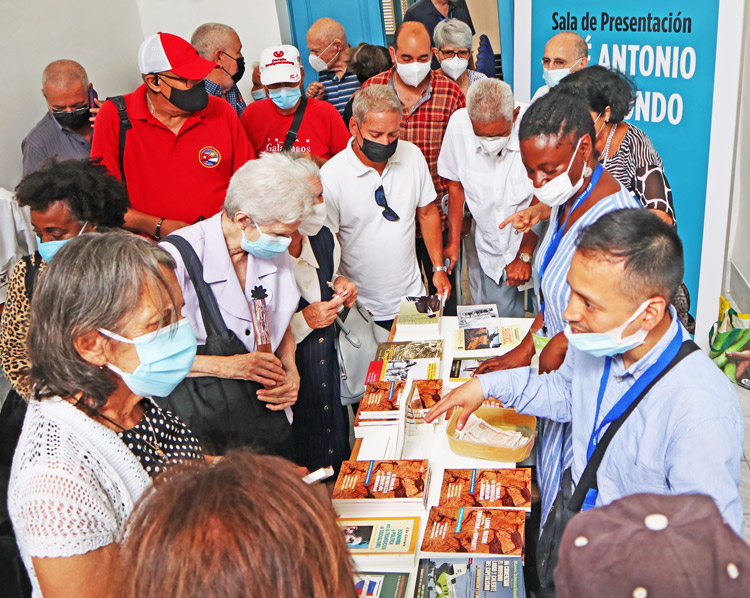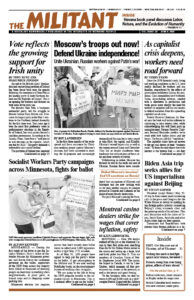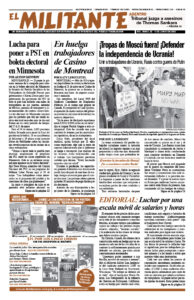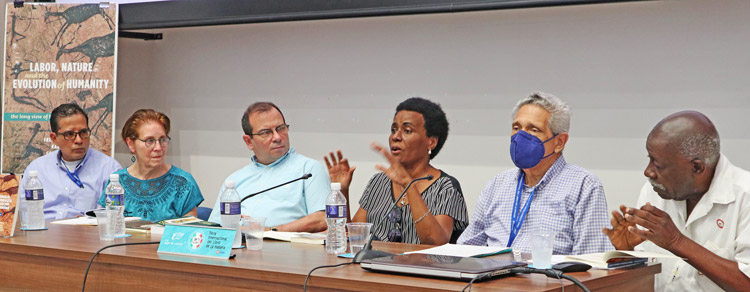HAVANA — “We all know, or at least sense, that the first large land war on the European continent in more than 75 years signals a new stage in the unraveling of the imperialist world order established by the victors of World War II,” said Mary-Alice Waters at a book launch during the Havana International Book Fair.
“The politics we are discussing here today have everything to do with our ability to chart a working-class course in this unknown future.”
Waters, a leader of the Socialist Workers Party and president of Pathfinder Press, was speaking as part of a panel that presented Pathfinder’s newest title, Labor, Nature, and the Evolution of Humanity: The Long View of History. (For the text of Waters’ remarks, see page 9.)
A new and urgent sense of the need to understand the roots of sharpening class conflicts in the world today is what attracted many people at the fair to that book and other titles available at the Pathfinder booth. It also marked the April 24 book presentation, which drew some 50 people.
The panel included Fernando González, president of the Cuban Institute for Friendship with the Peoples (ICAP); Zuleica Romay, director of Afro-American Studies at Casa de las Américas; Pedro Pablo Rodríguez, lead editor of the complete works of José Martí; and longtime revolutionary combatant Víctor Dreke. Pathfinder editor Róger Calero chaired the meeting.
Labor, Nature, and the Evolution of Humanity includes writings by Frederick Engels, Karl Marx, and George Novack, along with an opening article by Waters that takes up the importance of those fundamental works of Marxism in today’s class struggle. They are the real answer, she stressed in her remarks, to the “anti-working-class, anti-science, race-baiting ‘identity politics’ and ‘cancel culture’ that increasingly permeate privileged middle-class layers” in U.S. universities and far beyond.
“This is a much-needed book,” said Zuleica Romay in her remarks. “We are living through a time of contention between struggles to bring about a better future for the human species and a system, capitalism, that refuses to disappear.”
“People can go out and fight around everyday problems,” she said. “But they need clear reference points to be able to transcend these individual situations as they fight. That’s exactly what this book is about.”
A scientific understanding of history
A scientific, Marxist understanding of history helps provide that broader perspective, Romay said. In Cuba, for example, with all the lessons of its revolutionary struggles, how can you fight for a better future “if you don’t have knowledge about the history of your country? What values are you going to defend if you don’t know how much it has cost to be able to enjoy the things we have won?”
She pointed to how the politics of “identity fundamentalism,” pervasive in Latin American academic and left circles today, obscures a class understanding of the world, and that “in Cuba we’re not exempt from that.”
Romay cited several examples. She told of attending international conferences where some argued “that the problems of sexism can only be addressed by women, that the problems of racial discrimination can only be dealt with by those of African heritage.”
The capitalist rulers around the world “are very happy” with such views because it means “we’re fighting among ourselves while the status quo remains unchanged.”
Similarly, there are those who claim that the Marxism of the founders of the communist movement in the 19th century was “European and racist.” They counterpose it to what they call “black Marxism” today. “No, there is only one Marxism,” Romay replied. “It is a great river enriched by many different tributaries flowing into it.”
Referring to arguments that slavery and racism have been the driving force of history, Romay said, “You can’t ignore the place of slavery in U.S. history,” or in the history of Cuba and the entire Caribbean. “But you also can’t say that everything begins and ends with that. History didn’t begin with slavery. Capitalism already existed.”
Víctor Dreke also addressed this question, arguing against those who call for tearing down historical statues and buildings because they are identified in some way with slave owners.
He pointed to the beauty of the newly restored 18th century Spanish colonial building in Old Havana where the meeting was being held, known as the Palacio del Segundo Cabo (Palace of the Second Lieutenant, the Spanish vice governor).
‘What, tear down this building?’
“As I was climbing the stairs to enter this building,” Dreke said, “another compañero told me, ‘These stairs are impressive.’ And I told him, ‘Yes, and they weren’t built by the Spanish slave owners. They were built by Black slaves and Chinese indentured laborers.’
“So, what are we going to do?” he asked the audience. “Should we tear down this building? No, we should preserve, defend it, make it even more beautiful.”
He underscored that revolutionaries in Cuba have contributed to the communist movement, from Carlos Baliño and Julio Antonio Mella, founders of the early Cuban Communist Party in 1925, to Fidel Castro and Ernesto Che Guevara. He noted that the book launch was being held April 24, the anniversary of the day in 1965 when a forward detachment of revolutionary Cuban combatants set foot in the Congo to join national liberation fighters there. Dreke was second-in-command of the 128 Cuban volunteers led by Guevara.
Books like Labor, Nature, and the Evolution of Humanity are important in the world today, Dreke said, “and they’re important for us in Cuba today.”
He recalled his work over the years with the Socialist Workers Party, including a 2002 speaking tour in the United States to present the book From the Escambray to the Congo, an account of Dreke’s revolutionary course over decades, published by Pathfinder. He described how SWP members, leading others, defended a public meeting in Miami where he and Ana Morales spoke, preventing counterrevolutionary Cuban Americans from storming the platform and busting up the meeting.
Fernando González picked up on Romay’s comments about “identity politics” and joked that he happened to be a “white male” who was going to talk about the fight for women’s liberation. González is one of the five Cuban revolutionaries who spent up to 16 years in U.S. prisons for their work to protect the Cuban people against violent attacks by U.S.-based counterrevolutionary groups.

During those years in prison, González said, “I was a beneficiary of many Pathfinder books. “I had a lot of time to read,” he joked, and “I came out of prison more revolutionary than when I went in.” One of the books he studied there was George Novack’s The Long View of History, “which gave me a historical perspective about the advance of humanity.” That pamphlet is now incorporated as two of the chapters in Labor, Nature, and the Evolution of Humanity: The Long View of History.
Holding up a copy of Woman’s Evolution, by Evelyn Reed, González said it was one of his favorite books while in prison. He noted that Labor, Nature, and the Evolution of Humanity cites Reed’s work on the centrality of women’s social labor in the rise of civilization. He also highlighted the importance of the chapter by Frederick Engels, “The part played by labor in the transition from ape to man.”
‘Capitalism won’t disappear by itself’
Studying these books, he concluded, “is essential for understanding the world in which we live. Capitalism will not disappear by itself. It must be disappeared, through the struggles of men and women to transform society.”
Pedro Pablo Rodríguez said that in the course of preparing an edition of the complete works of José Martí, leader of Cuba’s 19th century independence struggle and opponent of slavery, he had previously studied writings by George Novack that “opened my horizons” to a materialist explanation of U.S. history.
Novack’s articles in the new book, he noted, began as classes he gave in 1955 “to young people at a socialist summer school,” part of the SWP’s work to educate new generations of youth attracted to the communist movement. Today, he said, the party is continuing that political work with the most recent books published by Pathfinder.
Chatting with audience members after the meeting, Rodríguez recounted how he had been confronted by a participant in an activity organized by the José Martí Studies Center who chided him, “How can you defend Martí? He wasn’t black!”
Labor, Nature, and the Evolution of Humanity “is not a book primarily about the past,” said Mary-Alice Waters in her closing remarks. It’s above all “about the class struggle today.”
Without knowing how labor transforms nature, how it is the motor force of humanity’s advances, she noted, “we remain prisoners of the present. We remain unable to see beyond the relations of capitalist exploitation and oppression that warp every aspect of our lives, social relations, personal values, observations — and ‘theorizing.’”
It is only the perspective advanced in this book, she said, that will allow a working-class vanguard of all nationalities, religions, skin colors, and both sexes to “develop the experience, fighting capacities and political confidence” to lead millions to overturn capitalist rule and build “a new state created by the working class,” Waters concluded.
Labor, Nature, and the Evolution of Humanity was one of the highest-selling Pathfinder titles over the course of the Havana book fair. Some 150 copies were bought at the book stand and the presentations. In addition, more than 100 were donated to various institutions as well as the José Martí National Library and the University of Havana library for distribution to libraries in every province across Cuba.


